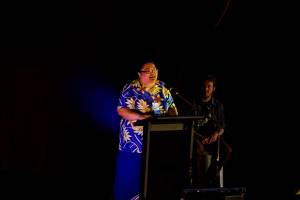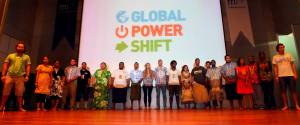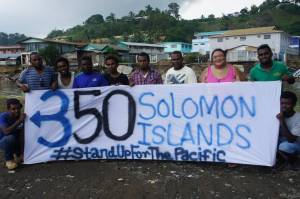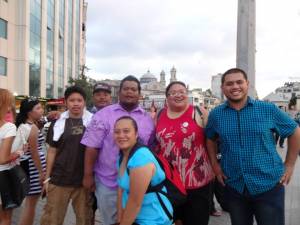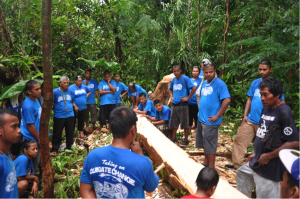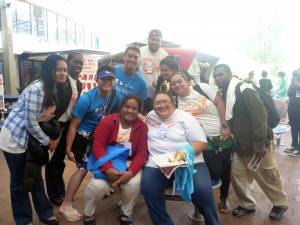At the end of 2012, I spoke of faith at the NZ-Pacific Power Shift. I talked about a few things but it was my mentioning of faith that copped me some criticism in a survey of participants that stood out for me. And it hurt. It was only one or two comments from a largely positive reaction but it’s the bad things about you that you remember, right?
At the time, this made me question my place in the climate movement: can someone with faith in God be part of a climate change movement – which is derived by proven scientific fact? I was new to the climate movement – a baby climate activist – so I took this knock-back fairly hard as I was trying to connect to my new passion and if it rejected one of the core aspects of my being, would it reject the other important part? My culture?
Well I decided it couldn’t ignore either.
Pacific people are at the front line of climate change – MY people are at the front line and we are all the same. Our faith and our culture go hand-in-hand and climate change is just as much our problem as it is for the rest of the world. Therefore, embarking on this Pacific Climate Warrior journey, it was important that we made this clear in our trainings – that our values and beliefs were important in this fight.
When we talk about “building a grassroots movement to fight the climate crisis”, grassroots means exactly that – people who are working to cultivate the land in villages and the provinces who have no political affiliations or anything to do with the large corporations of “Super Power” nations. People who just live every day working the land to provide for their families and whose existence depends on respecting the harmony between their environments, land and ocean.
What enables them to have that balance is their faith and culture.
What I have learned during these trainings is sobering. Pacific people are wise to the fact that while big consuming nations provide aid money to assist in adaptation and mitigation work in the Islands, they know a large percentage is returned to donor countries in “consultation” fees before, if any, is spent on the real need. What’s the point? Besides giving donor countries the opportunity to pat themselves on the back for “doing their bit”, it doesn’t really serve the people of the Pacific who suffer the injustices of a problem that they have not created.
In the Solomon Islands, one of the participants said that the biggest problem was that leaders were not taking it seriously enough. I couldn’t agree more. One of the things I have asked myself again and again is how do we make climate change just as important as religion and sport? I keep coming to same conclusion. It has to start at the top – and if that isn’t happening, then the people have to demand it.
So we are encouraging our people to demand it. We are planning extreme measures because we are in extreme times. The plans that the Pacific Warriors have for the coming year have been met with wide-eyed shock – but end with resounding excitement. There is a growing belief and resolve that what we are doing is not only possible, but necessary. None of that has stemmed from the findings of the IPCC or scientific fact etc. – although it’s a very important part of the puzzle.
Rather, it has come from a place of a deep love and care for their people and their homelands. At one of my first Pacific workshops in Wellington, a Samoan girl brought her two young siblings who were no older than six years of age. They joined in the workshop with everyone else and when given the opportunity to share their thoughts, the younger of the two sisters said “I want to do what I can to save my Pacific Island.” While she was born and raised in Wellington – like me – she, too, has inherited the love that we have for our cultural heritage.
With every training I have been a part of, we have begun and ended with prayer. Faith – of any denomination – binds us together. It is what we lean on in times of hardship and it is God whom we give glory and thanks for the strength to withstand the impacts of climate change in the Pacific. While I was raised in the Catholic faith, in the past 10 years I have become more spiritually open, acknowledging that fundamentally, Pacific people share a belief in the Almighty regardless of the way in which we practice.
I believe that without faith, I would not be able to have a genuine connection with those I have met along this journey. I have drawn strength from it at times when I have felt alone or weary, but more importantly it has enabled me to have the boldness to stand before our people and be real about climate change and the cost that it will incur on our future generations. It has eased my fears and frustrations and keeping God at the centre of this work, has given me strength to do things I never thought I was capable of.
In the next phase of our work, my faith is also a big driver. In tackling the issue of climate change for the Pacific, our area of focus is in our region – our neighbour who contributes so greatly to the threat. The Australian fossil fuel industry is profiting from the demise of the Pacific Islands. Being the world’s largest coal exporter feels like Australia is giving the Pacific a big middle finger. The Solomon Islands suffered flash floods last week and while here, I watched a piece on the news of some Australian secretary or other in the Solomon’s making the announcement that they would be giving $3 million dollars in aid because “the Solomon Islands is a good friend to Australia”.
This was followed by what I felt was a condescending comment about how the Solomon’s was such a resilient people. It was an embarrassment and came across as shameless self-promotion. That amount is appalling in comparison to the billions in profit that the Australian fossil fuel industry will make in 2014. I can no longer stand the phrase “Australia is the big brother to the Pacific” because big brothers usually act as protectors to their younger siblings – not participate in activities that bring them serious harm. The Australian government’s denial of climate change is hurting the Pacific Islands fight for climate justice and it cannot continue.
Our Pacific Climate Warriors in Fiji, Samoa, Tokelau, Nauru, Vanuatu, Tonga, Niue, Papua New Guinea, Federated States of Micronesia, Kiribati, Solomon Islands, American Samoa, Tuvalu, Palau and the Marshall Islands are preparing to send a message to the Australia fossil fuel industry that will be clear and difficult to ignore.
We will continue to reach out to other Pacific nations to join us and will be supported by friends and allies in Australia, New Zealand and around the world. It will be a bold and impassioned plea that will embody all the positive and peaceful attributes of true Pacific Warrior traditions. Our people ARE resilient but they are also fiercely protective and willing to do all they can to protect and preserve all that we hold dear – our land, our ocean and our future generations.
Being able to journey through the Pacific to roll out the Pacific Warrior trainings has been very humbling and a great honour. Travelling to Istanbul for Global Power Shift (GPS) last year and sharing our story with people working for climate justice all over the world was an absolute privilege. Being the Pacific coordinator for 350.org is a huge responsibility and I take none of the opportunities I have had for granted.
I stand shoulder to shoulder with friends and colleagues throughout the world fighting for climate justice in their own regions. Sharing that connection with our Pacific Warriors fills them with a stronger sense of pride, that we are not only doing this for the Pacific, but contributing to a truly global movement. But it also reminds us that this is something that we cannot do alone. To be successful, we need to work with everyone fighting this global climate crisis and share ideas, action plans, triumphs and trials because one size does not fit all.
What is working for us here in the Pacific may not work for those in Europe or in the USA but it might be useful to another country like the Philippines or India. The climate change movement has had to make a cultural shift because it runs the risk of excluding vulnerable at-risk communities who are desperately in need of support if it doesn’t. This has been the strength of 350.org – championing a climate movement that is culturally diverse and enabling us here in the Pacific to fight the climate crisis in a way that makes sense and is genuine, focussing on what is important to our people. And this has given rise to something very powerful. Hope.
***Koreti Tiumalu is the 350.org Pacific Coordinator***
